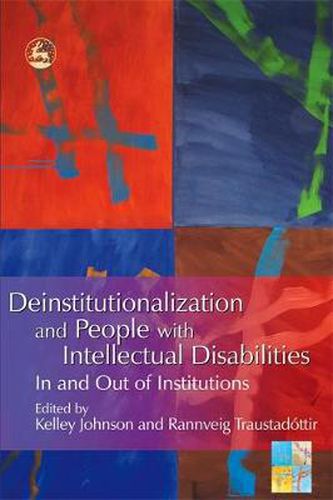Readings Newsletter
Become a Readings Member to make your shopping experience even easier.
Sign in or sign up for free!
You’re not far away from qualifying for FREE standard shipping within Australia
You’ve qualified for FREE standard shipping within Australia
The cart is loading…






Deinstitutionalization and People with Intellectual Disabilities is an international collaboration between qualitative researchers and former institutional residents with intellectual disabilities that presents a comprehensive overview of personal and professional perspectives on deinstitutionalisation. Personal stories alternate with cultural and political analysis, and reflections on implementing and evaluating deinstitutionalisation. This great diversity of perspectives is complemented by insights into the personal and professional life of one institutional ex-resident, Thomas Allen, whose story provides a powerful commentary on the effect of institutions and deinstitutionalisation on one individual over almost a century. Broader chapters consider the purposes of institutions and use historical case studies to identify reasons for admission or institutionalisation. The authors discuss a range of institutions, including nursing homes, jails, locked houses in the community and forensic units, and interrogate the contrasting notions of institutional oppression and on the other hand, integration and the empowerment it affords on the other. They challenge the continuing discrimination and marginalisation of disabled institutional residents or ex-residents in community life, arguing for a more positive, integrative approach. Researchers, practitioners and readers with intellectual disabilities will find this book an insightful, comprehensive reference.
$9.00 standard shipping within Australia
FREE standard shipping within Australia for orders over $100.00
Express & International shipping calculated at checkout
Deinstitutionalization and People with Intellectual Disabilities is an international collaboration between qualitative researchers and former institutional residents with intellectual disabilities that presents a comprehensive overview of personal and professional perspectives on deinstitutionalisation. Personal stories alternate with cultural and political analysis, and reflections on implementing and evaluating deinstitutionalisation. This great diversity of perspectives is complemented by insights into the personal and professional life of one institutional ex-resident, Thomas Allen, whose story provides a powerful commentary on the effect of institutions and deinstitutionalisation on one individual over almost a century. Broader chapters consider the purposes of institutions and use historical case studies to identify reasons for admission or institutionalisation. The authors discuss a range of institutions, including nursing homes, jails, locked houses in the community and forensic units, and interrogate the contrasting notions of institutional oppression and on the other hand, integration and the empowerment it affords on the other. They challenge the continuing discrimination and marginalisation of disabled institutional residents or ex-residents in community life, arguing for a more positive, integrative approach. Researchers, practitioners and readers with intellectual disabilities will find this book an insightful, comprehensive reference.